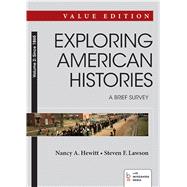Explore U.S. histories at an affordable price
Exploring American Histories, Value Edition, presents Nancy Hewitt and Steven Lawson's new U.S. history narrative in a two-color trade format with selected maps and images from the full-length text. The authors explore a variety of racial, ethnic, and socioeconomic perspectives and recognize the political, social, and economic contributions of both men and women in their narrative. Competitively priced to save your students money, the Value Edition includes online document projects and features Bedford/St. Martin's new digital history tools, including LearningCurve, an adaptive quizzing engine that garners over a 90% student satisfaction rate, and LaunchPad, the all new interactive e-book and course space that puts high quality easy-to-use assessment at your fingertips. Easy to integrate into your campus LMS, and featuring video, additional primary sources, a wealth of adaptive and summative quizzing, and more, LaunchPad cements student understanding of the text while helping them make progress toward learning outcomes. It's the best content joined up with the best technology.
What's in the LaunchPad








